Album review: Peter Garrett’s ideological anger remains on high simmer on The True North
On his second solo album, it’s no surprise that the Midnight Oil frontman’s songwriting agenda is driven by environmental issues, climate change and the state of the Indigenous nation.
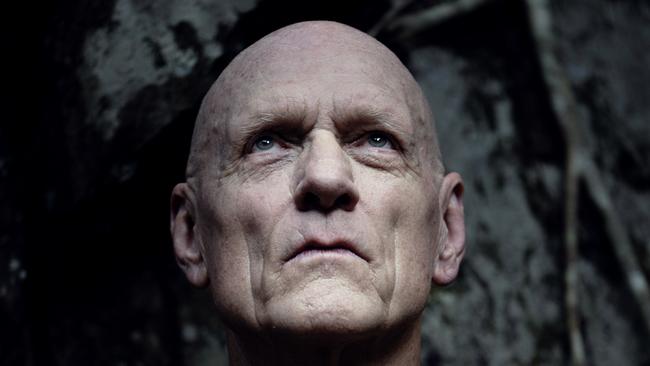
Album reviews for week of March 15 2024:
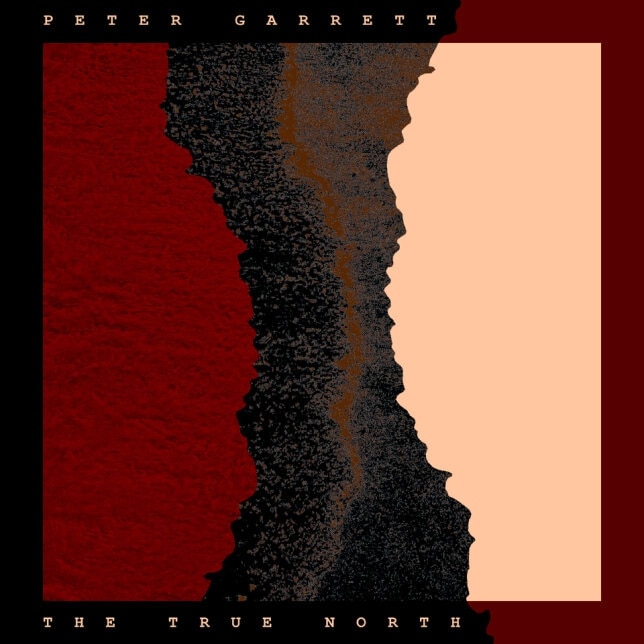
ROCK
The True North
Peter Garrett
Sony
Madjedbebe, in the deep north of Arnhem Land at Australia’s Top End, is the country’s oldest known site of human habitation. The evidence is manifest in the region’s ancient rock art, and it’s at the centre of the “True North” Peter Garrett identifies in the title track of his second solo album. No surprises, then, that environmental issues, climate change and the state of the Indigenous nation continue to drive the Midnight Oil frontman’s songwriting agenda. What may surprise some is that, even in his eighth decade, Garrett’s ideological anger remains on high simmer. He calls out the “empire builders, short sellers, tech bankers and rich listers” on Innocence Parts 1 & 2, also railing against the “high flyers [who] pay big bucks to get a selfie from outer space” and the “tax dodgers [who] smash the rough sleepers on their way”. Sonically, The True North is more lavishly produced than 2016’s A Version of Now. With personnel common to both albums – Oils guitarist Martin Rotsey, keys player Heather Shannon, and Garrett’s daughters May and Grace on backing vocals – the marked difference is drummer Evan Mannell, whose light, shade and heft contrast the steadier finesse of predecessor Pete Luscombe.
Both records also include raps of sorts, though on The True North’s Paddo — in part an ode to his hometown SCG — Garrett mocks it up like a sportscaster with playful references to late cricket star Shane Warne and the Sydney Swans. Rap gives way to spoken word on Innocence Part 2, as Garrett switches to public executioner: “And here they come: the enablers, the acolytes, the political laggards, the allegiance shifting, grifting, still grinning journos in the cheer squad bringing up the rear. All guilty as charged of the cruellest hoax of now.” He doesn’t ease up on Hey Archetype, an existential rockabilly romp that eviscerates the entitled over a blazing harp solo (Garrett’s) and Rotsey’s manic Duane Eddy-style guitar. On a lighter note, Currowan is a cosmic boogie plea for unity featuring a fine keys solo from Shannon, whose delicate piano also prefigures the far more urgent Meltdown, a climate- change lament that name-checks German philosophers Immanuel Kant and Hildegard of Bingen. It’s a high-minded reference, but both historical figures firmly believed in nature’s nexus with the divine. Garrett updates the notion to the 21st century with this somewhat blunter image: “We’re boiling frogs, it’s a Facebook blur, oh yeah.”
Phil Stafford

POST-PUNK
Tangk
Idles
Partisan
The decade didn’t get off to a flying start for Idles. 2020’s underwhelming Ultra Mono largely lacked bite, more occupied with responding to quote-unquote “haters” than its songwriting. The ship was course-corrected with 2021’s Crawler, however, and once restrictions lifted thousands flocked to see the Bristol post-punk band as it toured across the globe. So now that Idles has returned to form, what’s the next move? Easy: deviate from said form entirely. Tangk, its fifth album, is named for an onomatopoeic term coined by band members – “the guitars need a little more tangk,” they’d say. Through that idiosyncratic framework, nobody can out-tangk Idles. Whether it’s the rumble and snarl of Dead Horse, Roy’s jagged edges or Dancer’s bludgeoning hammer, the band constantly zigs when a zag is anticipated. Furthermore, its detours into balladry (A Gospel, and opener Idea 01) are among its most finely crafted to date. Throughout, Idles finds itself going to-and-fro between quiet and loud, prompting the listener to alternate between leaning in to hear and bathing in undeniable loudness. Tangk, in that respect, is a truly dynamic artistic statement.
David James Young
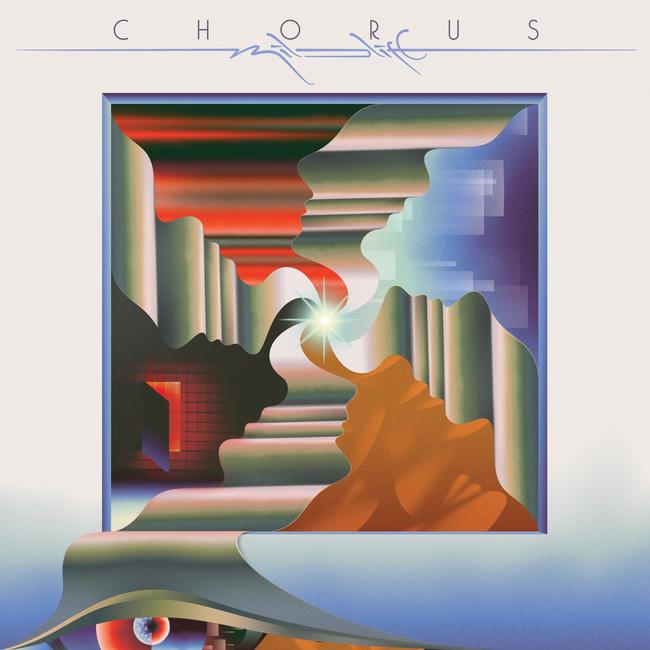
COSMIC FUNK
Chorus
Mildlife
[PIAS] Australia
Embarking on this third studio album with two ARIAs already in the bag, Mildlife has earned the right to explore at considerable leisure. And that’s what Chorus is all about: expanding the range and scope of the Melbourne quartet’s supple funk and jazz intersections into even headier horizons. Synth player Kevin McDowell, guitarist Adam Halliwell, bassist Tom Shanahan and percussionist Jim Rindfleish approach the task with real finesse, further refining an interplay that was already uncommonly smooth. McDowell’s dreamy lead vocals play into the band’s chill and jammy tendencies, while his often disco-grade synths turn tracks like Yourself and Sunrise into sparkling roller-rink flashbacks. The especially frisky Musica arose from improvisational passages developed during marathon live encores, while also paying tribute to the passing of Halliwell’s Italian grandmother. The instrumental title track slows the pace right down across nine minutes, and similarly lengthy closer Return to Centaurus adds syrupy vocoder to the band’s pursuit of an endless groove.
Doug Wallen

BLUEGRASS
Between The Lines
The Price Sisters
McCoury Music
There has been a paucity of notable female duos in the bluegrass field since the 1960s/70s’ pairing of Hazel Dickens and Alice Gerrard, the first women to capture the “high and lonesome” sound popularised by the genre’s 1930s progenitors Bill Monroe and his Blue Grass Boys. The emergence of Ohio-born twin sisters Lauren and Leanna Price could usher in a new era. That these precocious siblings are exciting and gifted young exemplars of the American roots music genre radiates from every track on Between The Lines – not only as exquisite lead and harmony singers, but also as highly skilled instrumentalists and arrangers. Supporting the dynamic vocalising and playing of Lauren (on mandolin) and Leanna (on fiddle) on a nicely balanced selection of songs and instrumentals – save one captivating a cappella duet – is a backline of regular bandmates and special guests adding guitar, banjo and double bass. While honouring the bluegrass art-form and all its complexities, the Price Sisters inject contemporary appeal by blending in modern manifestations of Americana. Bill Monroe would assuredly have approved.
Tony Hillier
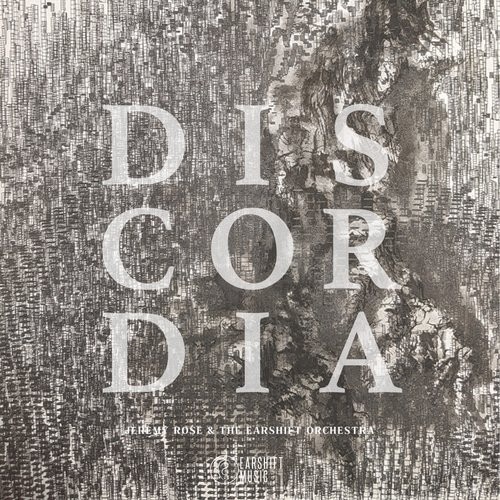
JAZZ
Discordia
Jeremy Rose & The Earshift Orchestra
Earshift Music
This extraordinary album deserves as many accolades as possible. It’s Sydney saxophonist Jeremy Rose’s follow-up to his celebrated 2018 oratorio Iron in the Blood, and once again, he uses the standard jazz big band line-up: five saxophones, four trumpets, four trombones and rhythm section. But Rose’s music is anything but standard. His nine compositions offer a compelling vision as to how the big band of the future will sound. Many dense soundscapes here are full of majesty, and out of those soundscapes emerge some of the most individual voices in Australian jazz, particularly from the rhythm section: Novak Manojlovic’s ruminative piano work, the ethereal guitar playing of Hilary Geddes and the crisp drumming of Chloe Kim. Rose himself provides the album’s highlight: a beautiful work called Unverified Persona which serves as a mini-concerto for bass clarinet and orchestra. As usual, Rose’s music has a fascinating social purpose: he describes Discordia as “a mosaic of reflections, highlighting the looming shadows of a society veering towards apparitions, yet interspersed with rays of clarity.”
Eric Myers
Album reviews for week of March 8 2024:
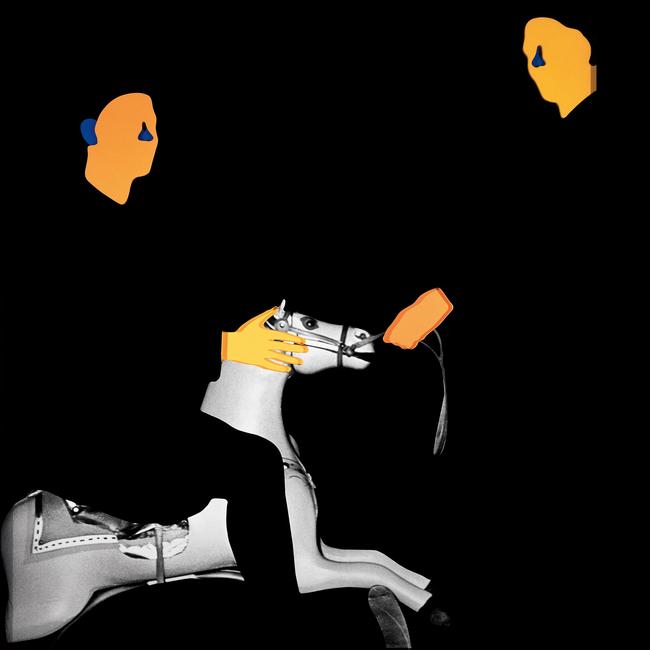
PSYCHEDELIC POP
Loss of Life
MGMT
Mom + Pop
Powered by wonky synth hooks and crunchy psychedelic production, MGMT’s 2007 debut Oracular Spectacular made such an outsized splash that the Connecticut duo of Ben Goldwasser and Andrew VanWyngarden has been guaranteed a healthy degree of attention for everything they’ve come up with since. They’ve rarely attempted to issue the same kind of undeniable earworms heard on the first record, though, and it’s been fascinating to watch the pair defy expectations and continually mutate their sound across subsequent albums. The misunderstood 2010 opus Congratulations paid brilliant homage to outsider pop, while 2013’s MGMT stacked on endless heady textures and 2018’s Little Dark Age refreshed the band’s pop instincts with a smirking, goth-shaded take on synth-pop. Now comes Loss of Life, a subdued amble down a winding series of cosmic ballads. This fifth album definitely sets the psychedelic scene with the patchwork preamble Loss of Life (Part 2), but that short introduction proves to be among the album’s trippier moments, along with spoken-word interlude Bubblegum Dog. The remainder hews more towards sparse folk, with the Flaming Lips-esque Mother Nature supplying some of the record’s only rock flourishes. This isn’t a complaint, but a reminder to adjust those expectations accordingly.
And there are stretches of pleasant disorientation: People in the Streets courts wayward effects before culminating in a flutter of synth melodies, while the horn interlude on Nothing to Declare edges into haunted muzak. Nothing Changes evokes David Bowie’s Space Oddity, and I Wish I Was Joking drops a left-field lyrical reference to Steve Miller Band’s The Joker. Given how low-key and elliptical these songs are, those odd details stand out all the more. There’s a gorgeous sense of space and drama throughout the album, despite the duo’s commitment to maintaining a fairly uniform mode here. The notable exception is Dancing in Babylon, a duet with French singer-songwriter Christine and the Queens. Flaunting strong shades of throwback soft rock before adding a dance pulse, it stokes the kind of romantic melodrama that would feel at home in The Killers (or even classic Meatloaf). A whole album of songs like that one might have provided MGMT’s biggest moment since Oracular Spectacular, but there was no way that Goldwasser and VanWyngarden were ever going to do anything that easy – or that obvious.
Doug Wallen
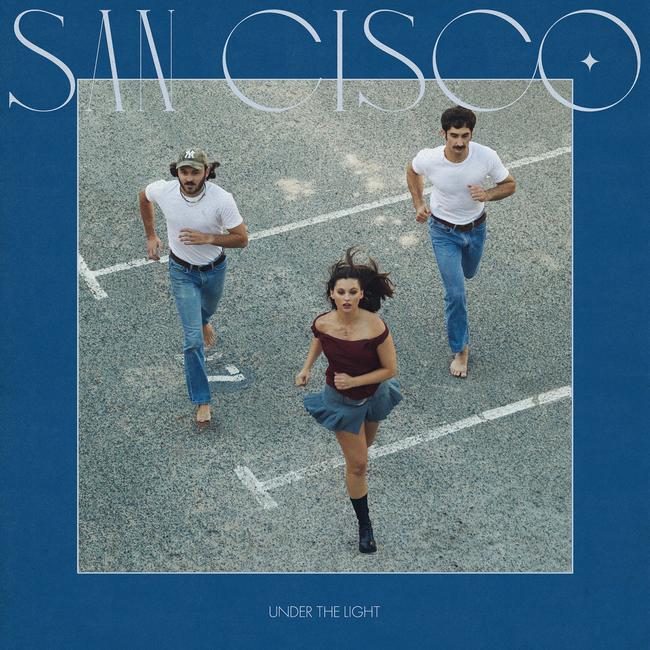
INDIE ROCK
Under the Light
San Cisco
Island City Records
Watching San Cisco’s career is akin to observing a teen transition to adulthood. The youthful zeal of the Fremantle band’s early output has become somewhat more refined as the trio matures, both as people and as musicians. As with all young adults, there (hopefully) comes a stage where one accepts who they are, warts and all, and steps out into the world a little more confidently. That’s what fifth album Under The Light sounds like. Songs such as High, One Percent and Summer Days — the latter featuring a whimsical cameo from Nick Allbrook of Pond and former Tame Impala fame — are packed with all the standard San Cisco goodies: gentle melodies, playful synths, and Scarlett Stevens’ excellent work behind the kit, all wrapped up and delivered with the assurance of a band that knows how to please its fans. Consequence and the closing number Into My Heart are the album’s high points; the former is a dance-rock jam that wouldn’t be out of place on Arcade Fire’s Reflektor, and the latter is a folky pop proverb that proves the value of doing more with less. Once again, San Cisco’s combination of danceability and genuine songcraft proves a winner.
Alasdair Belling

WORLD/POP
Plastic Man
Touki
Captain Pouch
On their second album, Touki’s principal musicians – British-Senegalese Amadou Diagne and French-American Cory Seznec – combine songs addressing weighty global matters as climate change and the refugee crisis with personal stories, West African fables and a trio of tunes. Utilising predominantly perky rhythms and mellifluous melodies, the pair draws on an array of instrumentation including one-stringed Ethiopian bowed lute (masenqo) and 21-string West African harp (kora), Appalachian banjo and muted acoustic guitar, violin and cello and percolating percussion. The contrasting singing styles of the alternating bandleaders – Diagne’s soulful, soaring Senegalese, and Seznec’s softer, lower register in English – work beautifully as a duet in the haunting Don’t Look Away. A couple of catchy instrumentals bear the influence of dancing western Kenyan omutibo guitar music, while the mbalax-styled title track melds Senegalese and Cuban influence, and the West-African/American country fusion of Fula Cowboy brings an engaging set to its conclusion.
Tony Hillier

CLASSICAL
Porgy and Bess Fantasy: Music for Two Pianos
David Bollard and David Stanhope
Tall Poppies
Forty years ago, two Sydney-based pianists embarked on an occasional series of piano programs. Both David Stanhope and David Bollard were associated with the Australia Ensemble and recorded extensively for Tall Poppies. Now their early concerts have been assembled on a double-album set and with some technical wizardry, the performances sound as fresh as though recorded yesterday. Each of the nine works was recorded before live audiences in different venues, the oldest performance dating from 1980 in the Sydney Town Hall. Remarkably, the recording quality sounds fairly uniform throughout. Half the program comprises familiar repertoire: Mozart, Saint-Saens, Rachmaninov, Debussy and an exhilarating version of the Grainger/Gershwin Porgy Fantasy. The latter is hardly surprising given that composer and conductor Stanhope is the pre-eminent Grainger-ranger in the country — hence the authoritative versions of so much Grainger, notably a breakneck version of Green Bushes, with Leslie Howard providing an extra pair of hands. Fun stuff, all 147 minutes of it!
Vincent Plush
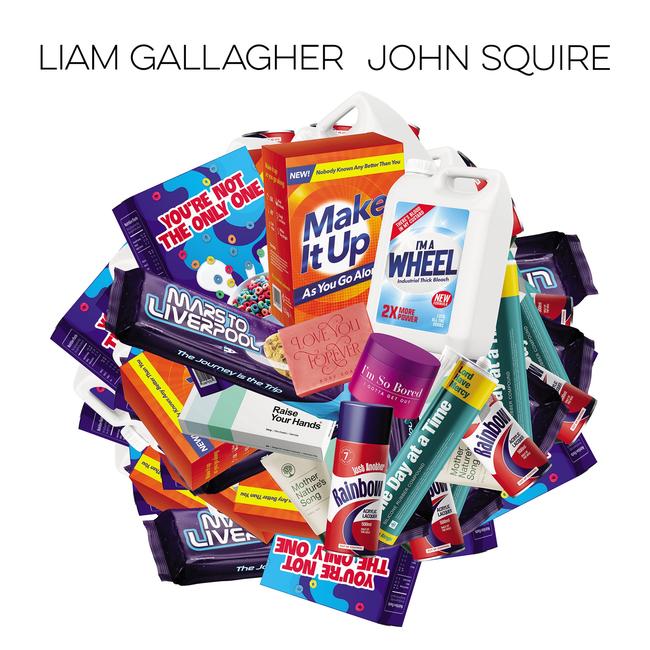
ROCK
Liam Gallager & John Squire
Liam Gallager & John Squire
Warner Music Australia
It has always been easy to view Liam Gallagher as a yobbo dolt. Brother Noel was the more talented one: the sharper wit, the great Oasis songwriter. But Liam G remains one of the most gifted vocalists in rock ‘n’ roll, pitched between Rotten and Lennon with Bolan’s way of bending a single word beautifully out of shape. He gave Oasis its vocal glow of romance. It’s arguable John Squire’s shimmer-and-chime momentum as a guitarist was meshed into a similarly grand tension with Ian Brown’s threatening charisma out front of fellow British act The Stone Roses. All of a sudden, Gallagher (51) and Squire (61) are mimicking their own musical history and, unsurprisingly, the duo’s self-titled debut sounds like Oasis meets The Stone Roses, with a splash of The Beatles’ pop psychedelia (an influence from which both drew originally). As such, nothing here truly surprises, other than the fresh energy and a production of bright and forceful density. This is an album made for the British spring: for parties, for outdoor music festivals in need of epic rock ‘n’ roll to fill the sky. Squire has written all 10 songs here, and Gallagher sings his magnificent heart out.
Mark Mordue
